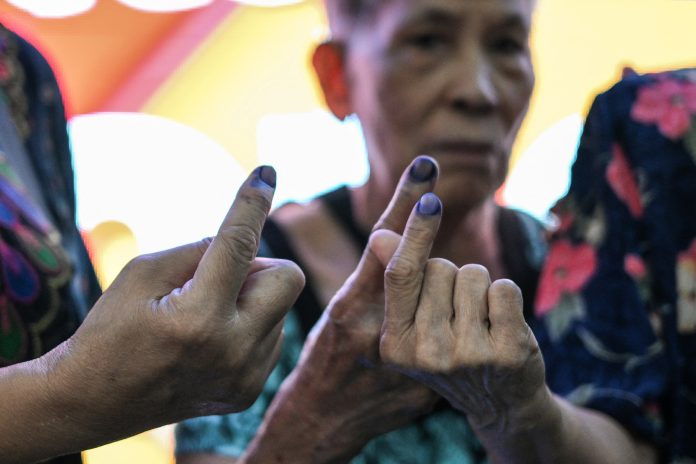Updated: 4:25 pm Manila time
Millions of Filipinos endured blistering heat and long queues on Monday to cast their votes in a midterm election overshadowed by a deepening political feud between President Ferdinand Marcos Jr. and impeached Vice President Sara Duterte.
With 75 percent of precincts reporting, initial figures from the Commission on Elections (Comelec) showed five Senate candidates allied with Duterte poised to win seats—one more than predicted in pre-election surveys.
If the trend holds, it would bolster her position ahead of a Senate impeachment trial tentatively scheduled for July.
Five Marcos-backed candidates and two independents also appeared headed for Senate seats as of Monday evening, according to a report by Agence France-Presse.
The vote covered more than 18,000 elective positions nationwide, including members of the House of Representatives and municipal offices.
But beyond the political stakes, election day was marred by widespread disenfranchisement, technical failures, and violence, according to local watchdogs and international monitors.
Rights observers cite violence, machine failures, and voter suppression as major threats to the integrity of PH elections.
A preliminary report by the International Observer Mission (IOM), composed of global human rights advocates, flagged severe concerns over the credibility of the elections. In partnership with Vote Report PH and Kontra Daya, the IOM documented numerous irregularities across multiple regions.
“These aren’t just technical glitches, we are seeing failures that are disenfranchising thousands of Filipinos at a critical democratic moment,” said Commissioner Lee Rhiannon, a former Australian senator.
“Our rights-based methodology has revealed violations of civil and political rights, including the right to vote, occurring on and around election day. Our mission is to document and to amplify what the Filipino people are already bravely calling out,” he added.
The IOM cited malfunctioning automated counting machines (ACMs), pre-shaded ballots, vote-buying, and unexplained software updates among the issues that cast doubt on the vote’s integrity.
In some locations, valid ballots were wrongly read as overvotes, nullifying votes. At least one polling center in Southern Tagalog had over 900 voters queueing for a single ACM, with many walking away without casting their vote.
In Negros, priority voters were asked to hand ballots to poll workers who dropped them into cardboard boxes—prompting concerns over tampering.
Comelec chairman George Garcia acknowledged delays due to ACMs overheating. “Due to the extreme heat, the ink (on the ballots) does not dry immediately, and the ballot ends up stuck on the scanners,” he told reporters in Manila.
Electric fans were used in some locations to cool the machines. The heat also altered the color of indelible ink, Garcia added: “The ink… turned orange in the bottle.”
IOM observers noted that some ACMs were running version 3.5.0 software, rather than the certified version 3.4.0.
“We are collaborating with our partners in the Philippines to look into this irregularity,” said Commissioner Colleen Moore, Director of Peace with Justice at the General Board of Church and Society.
In Zamboanga, voters reported that partylist names they selected did not appear in their printed vote receipts.
Feud with Presidential Stakes
The Marcos-Duterte feud has intensified since February, when Duterte was impeached by the House of Representatives over alleged corruption and plotting to assassinate the president.
To strengthen her Senate bloc ahead of the trial, Duterte’s camp added Marcos’s sister Imee and television host Camille Villar to their party’s Senate slate.
The outcome could influence the 2028 presidential race. The 12 senators elected this cycle will serve as half of the jury in Duterte’s impeachment trial. A guilty verdict would permanently bar her from public office.
Duterte’s father, former president Rodrigo Duterte, who is in detention in The Hague on charges of crimes against humanity, appeared set to reclaim the mayoralty of Davao City.
With 77 percent of votes counted, he led his rival by more than half a million votes. Several other Duterte family members also appeared headed for victory in local races.
Election Violence and Red-Tagging
The vote was accompanied by violence in multiple provinces. In Basilan, three people—including a poll watcher—were killed and two others wounded in a pre-dawn boat ambush near Hadji Muhtamad town.
In the central Philippines, gunmen fired at a group near a party headquarters, killing two and injuring seven. In Mindanao’s autonomous Muslim region, at least two people were killed a day before the polls.
Vote Report PH recorded 1,445 cases of red-tagging—the most frequently reported election violation. Flyers and posters targeting progressive candidates circulated even on election day.
“We’ve observed a disturbing pattern: escalating violence, red-tagging of candidates and supporters, and coordinated disinformation against progressive voices,” said Moore. “These are not isolated incidents. They form a chilling atmosphere that compromises the safety and freedom of voters.”
The IOM said it will release a full report within two weeks. “The convergence of political violence, widespread disenfranchisement, harassment, and unexplained technical irregularities point to systemic vulnerabilities that risk undermining public trust in the electoral process,” said Rhiannon.
According to police data, 81 politically related incidents occurred from January to early May, with at least 16 fatalities. More than 163,000 police officers were deployed nationwide to guard polling stations and escort election staff. – with reports from Agence France-Presse









